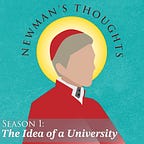Reading for Day 4: The Idea of a University, Preface, ¶ 13-14
Paperback with Introduction by Dr. Don Briel available @ Cluny Media
Full online text of The Idea of a University and other works by St. John Henry Newman are available @ the National Institute for Newman Studies’ Newman Reader
It were well if none remained boys all their lives; but what more common than the sight of grown men, talking on political or moral or religious subjects, in that offhand, idle way, which we signify by the word unreal? "That they simply do not know what they are talking about" is the spontaneous silent remark of any man of sense who hears them. Hence such persons have no difficulty in contradicting themselves in successive sentences, without being conscious of it. Hence others, whose defect in intellectual training is more latent, have their most unfortunate crotchets, as they are called, or hobbies, which deprive them of the influence which their estimable qualities would otherwise secure. Hence others can never look straight before them, never see the point, and have no difficulties in the most difficult subjects. Others are hopelessly obstinate and prejudiced, and, after they have been driven from their opinions, return to them the next moment without even an attempt to explain why. Others are so intemperate and intractable that there is no greater calamity for a good cause than that they should get hold of it. It is very plain from the very particulars I have mentioned that, in this delineation of intellectual infirmities, I am drawing, not from Catholics, but from the world at large; I am referring to an evil which is forced upon us in every railway carriage, in every coffee-room or table-d'hôte, in every mixed company, an evil, however, to which Catholics are not less exposed than the rest of mankind.
When the intellect has once been properly trained and formed to have a connected view or grasp of things, it will display its powers with more or less effect according to its particular quality and capacity in the individual. In the case of most men it makes itself felt in the good sense, sobriety of thought, reasonableness, candour, self-command, and steadiness of view, which characterize it. In some it will have developed habits of business, power of influencing others, and sagacity. In others it will elicit the talent of philosophical speculation, and lead the mind forward to eminence in this or that intellectual department. In all it will be a faculty of entering with comparative ease into any subject of thought, and of taking up with aptitude any science or profession. All this it will be and will do in a measure, even when the mental formation be made after a model but partially true; for, as far as effectiveness goes, even false views of things have more influence and inspire more respect than no views at all. Men who fancy they see what is not are more energetic, and make their way better, than those who see nothing; and so the undoubting infidel, the fanatic, the heresiarch, are able to do much, while the mere hereditary Christian, who has never realized the truths which he holds, is unable to do any thing. But, if consistency of view can add so much strength even to error, what may it not be expected to furnish to the dignity, the energy, and the influence of Truth!




